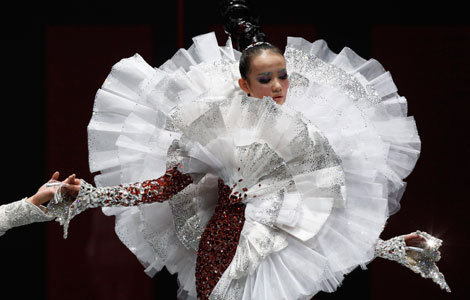

Executives in the Asia-Pacific region are earning the highest base salaries in the world, driven partly by employers in China sweetening pay packages to retain talent amid a severe management shortage, a survey has found.
The base salary for senior executives in the region during the year ended Sept 30 was $243,642, according to the recently released results.
The survey of 778 executives from around the world was carried out by the Association of Executive Search Consultants, an executive-consultant industry group.
In contrast, executives in the Americas had an annual base salary of $229,261, while the figure for bosses in the emerging markets of Europe, the Middle East and Africa, or EMEA, was $212,066.
In the Asia-Pacific region, most executives made between $201,000 and $250,000, the survey showed.
The majority of executives in the Americas were in the same pay range, while the highest percentage of executives in EMEA made between $151,000 and $200,000.
"Where there is a talent shortage, compensation would certainly be leveraged to attract the right talent," Joe Chappell, director of global marketing for the New York-based association, told China Daily.
Besides offering higher pay amid the management shortage, Chappell said rapid economic growth and inflation could also drive up salaries in the Asia-Pacific region.
China is grappling with the world's worst shortage of managers, mainly owing to a dearth of professionals with Mandarin and English-language skills who are familiar with local and business culture and who are willing to relocate at short notice, the association said.
The inability of China's business-education system to turn out high-quality managers fast enough to meet demand also contributes to the management shortage, the Financial Times reported in April.
Chappell said in August, "There isn't enough talent that fits the bill locally and not enough international talent equipped with the knowledge to take on the local Chinese market."
The shortage is not expected to ease any time soon, he said.
The association's president, Peter Felix, told China Daily at the time he sees the talent shortage hampering the ability of China and other developing nations to fulfill their growth aspirations.
While the Asia-Pacific region may be offering the highest base salaries in the world, a cost of living survey in July by Mercer, a consulting unit of Marsh & McLennan Cos, found that Hong Kong had the world's highest housing costs for expatriate employees.
It cost $7,100 a month to rent a luxury two-bedroom unfurnished apartment in Hong Kong, the survey found — more than the $6,500 it cost to rent a comparable apartment in Luanda, the capital of Angola, which Mercer ranked as the world's most expensive city for expatriates.
The association's survey looked at the base salaries of 67 executives from the Asia- Pacific region, compared with 274 from the Americas and 188 from EMEA.
Chappell said the sample size is "relevant to portray a broad picture of executive compensation worldwide and to compare the three broad regions of the world".
In the past, international companies offset local managerial shortages by bringing in Taiwan- and Hong Kong-born executives, hiring graduates born on the Chinese mainland returning from international universities, or by sending out expatriates.
But these managers can lack an instinct for local markets, the Financial Times reported. Cash-strapped global companies are also starting to balk at the cost of sending out expatriates, the newspaper said.
Meanwhile, as executives in the Asia-Pacific region enjoy the world's highest average base pay rates, executive salaries in general are slipping.
The association found that the average salary among global executives — also known as the "C suite" (for titles with "chief" in them, such as CEO, COO and CIO) — fell by 8.8 percent for the year ended Sept 30. Meanwhile, middle-management salaries rose by 4.6 percent during the same period.
"It is interesting to note that the C-suite appears to no longer be as differentiated from non-C-suite executive-level positions in terms of compensation," Chappell said.
Of executives surveyed who reported a rise in total compensation, the greatest percentage — 41.8 percent — reported an increase of 1 to 5 percent; 26.6 percent had a 6 to 10 percent increase, while 10 percent reported increases above 20 percent.
Felix said the results highlight the inconsistencies in perception about executives being overpaid.







